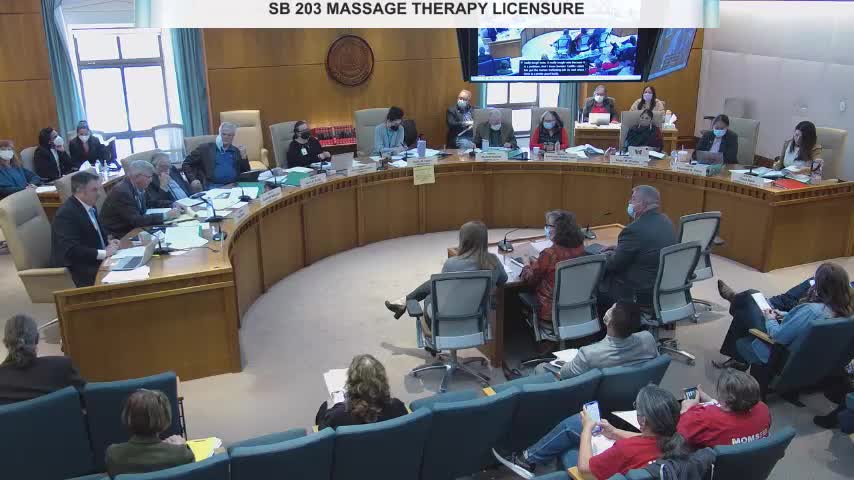Senate committee advances bill to let officers petition extreme‑risk firearm orders and require immediate gun relinquishment
Get AI-powered insights, summaries, and transcripts
Subscribe
Summary
The Senate Health and Public Affairs Committee voted to send amendments to the state's extreme‑risk protection law to the Judiciary Committee, including clarifying that law enforcement may file petitions and requiring immediate relinquishment of firearms upon service of an order.
The Senate Health and Public Affairs Committee voted to forward changes to New Mexico’s extreme‑risk firearm protection order law (the IRPA) to the Judiciary Committee after a lengthy hearing featuring law‑enforcement witnesses and victims’ advocates.
The proposed changes in House Bill 12, presented by Representative Garrett, would explicitly allow law‑enforcement officers to file petitions for extreme‑risk firearm protection orders based on credible information obtained in their official duties and would require immediate relinquishment of firearms upon service of an order rather than permitting a 48‑hour delay. “The changes proposed in House Bill 12 are a direct result of enforcement officers implementing the IRPA act in several instances around the state,” Garrett said in opening remarks, noting the law has been used in at least 19 of New Mexico’s 33 counties since 2020.
Supporters told the committee the amendments reflect on‑the‑ground experience. Sergeant Matt Tinney of the Albuquerque Police Department, Lieutenant Janice Madrid (IRPA Task Force), Deputy Chief Carol Lehi‑Winn of the New Mexico State Police and Laura Sunderman of the Department of Justice answered legislators’ questions about operational details. Miranda Viscoli of New Mexicans to Prevent Gun Violence and several members of Moms Demand Action offered accounts of local incidents and urged the committee to adopt the changes. One supporter said immediate relinquishment could have prevented a recent mass shooting attempt in Farmington by removing guns during an interim period when the existing 48‑hour rule allowed time for escalation.
Committee members pressed witnesses on procedural safeguards and implementation. Senators asked how officers determine when information is “credible,” how courts and law enforcement coordinate to ensure due process, and what happens if a respondent denies possessing firearms. Witnesses described steps officers take to establish probable cause and noted that the bill preserves court hearings (a hearing is required within 10 days under existing statute). The Department of Public Safety and the state IRPA task force said the proposed changes would align New Mexico with practices in other jurisdictions and resolve inconsistent judicial interpretations among the state’s judicial districts.
Victim‑advocate testimony emphasized timing. Psychiatric nurse Elaine Miller cited national comparisons and argued New Mexico’s 48‑hour window is an outlier: “Of the 19 states with IRPO laws, only four do not require immediate relinquishment,” she said. A survivor who testified by phone described multiple police contacts with an ex‑partner who later used a gun; she urged the committee not to preserve any 48‑hour gap.
The committee recorded a do‑pass recommendation to send the bill and the sponsors’ amendments to the Judiciary Committee. Committee members repeatedly noted the measure is a narrow civil remedy, not a criminal conviction, and that other charges or interventions remain available to law enforcement when appropriate.
The committee hearing included questions about tracking and outcomes: witnesses said the state tracks filings and that most filings have involved behavioral‑health crises or domestic‑violence contexts, with Bernalillo County accounting for the majority of petitions. Several senators asked for more disaggregated data about rural versus urban use; witnesses said filings occur statewide and the state task force compiles those statistics.
Next steps: the committee’s due‑pass recommendation sends House Bill 12 and its amendments to the Senate Judiciary Committee for further consideration and potential amendment. The bill’s text, as discussed in hearing, would (1) permit law‑enforcement officers to petition based on credible information gathered during their duties, (2) require immediate relinquishment upon service, and (3) preserve the existing 10‑day hearing timeline and evidentiary requirements already in statute.
Ending note: Sponsors and law‑enforcement witnesses urged lawmakers to treat the changes as technical but safety‑critical fixes to an existing tool. Supporters said the amendments are intended to make IRPA work more predictably across judicial districts and to reduce short windows of heightened risk for victims and officers.
